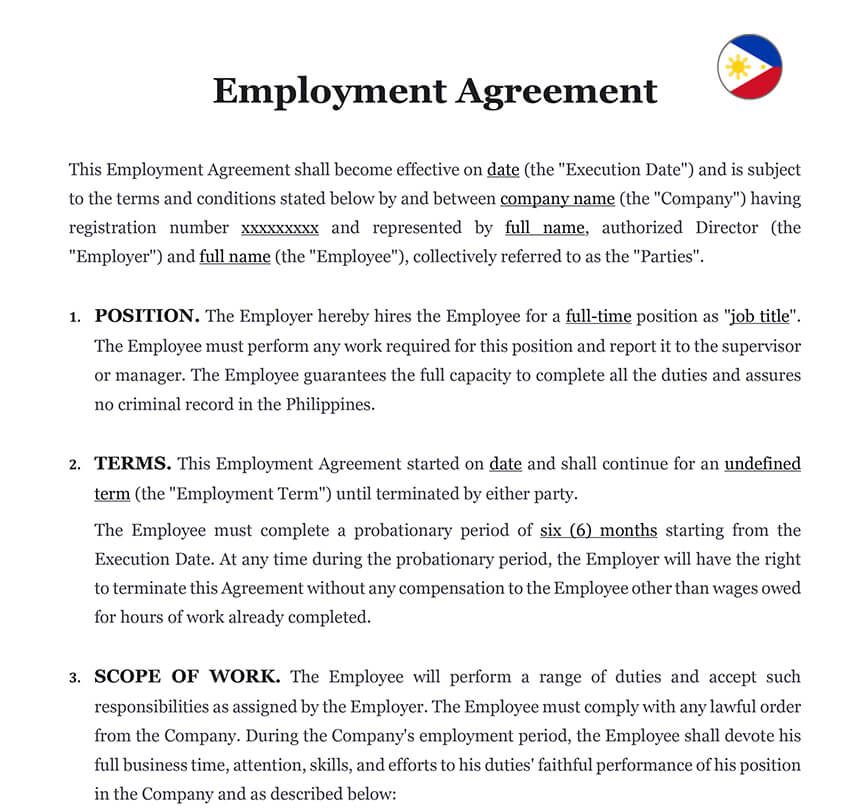
This Employment Contract is easy to use for any type of employment, including fixed-term or indefinite. It sets out the important terms and conditions of employment.

Word Document (.docx)

Ready to use legal template
Drafted by experienced lawyers
Compliant with Filipino law
Ready to use legal template
Drafted by lawyers
Compliant with Filipino law
Using an Employment Contract in the Philippines is important for both employers and employees as it sets out the terms and conditions of the employment relationship. The contract helps to establish a clear understanding of the rights and obligations of both parties, such as the employee’s job duties, compensation, benefits, working hours, and other important details. It can also help to prevent misunderstandings or disputes that may arise during the course of employment. Under Philippine labor laws, an Employment Contract is required for all regular employees, and failure to provide one may result in legal liabilities for the employer. Download this Employment Contract template written by lawyers in accordance with Philippine law in an easy to edit Word document.
An Employment Contract in the Philippines is a legally binding agreement between an employer and an employee, setting out the terms and conditions of the employment relationship. The contract of employment defines the rights, duties, and obligations of both parties, and is governed by Philippine labor laws.
The contract of employment must be in writing and must be executed before the employee begins work. The contract must include details such as the names and addresses of the employer and employee, the nature of the work to be performed, the period of employment, the place of work, the rate of pay, the number of working hours per day and per week, and the benefits to be provided to the employee.
ℹ️ An Employment Contract serves as proof of the terms and conditions of the employment relationship and helps to protect the rights of both the employer and the employee. In the event of a dispute, the employment contract can be used as evidence in resolving the issue.
A fixed-term employment agreement sets a specific end date for the employment relationship. This type of agreement is often used for seasonal or temporary workers, or for workers on a project-by-project basis.
An indefinite employment agreement has no set end date, and continues until either the employee or the employer terminates the relationship. This type of agreement is the most common type of employment agreement and is used for full-time, permanent workers.
A part-time employment agreement sets a specific number of working hours per week for the employee, who is usually paid on an hourly basis.
A freelance or Consulting Agreement sets the terms and conditions of the working relationship between an independent contractor and the company they work for. This type of agreement is often used for short-term projects or one-time assignments.
If you want to hire a freelancer we suggest you download our Employee Confidentiality Agreement to protect your confidential business information.
Under Philippine labor laws, all employment relationships must be governed by a written contract of employment, which sets out the terms and conditions of the employment relationship.
It serves as a record of the terms and conditions of the employment relationship, including the responsibilities, benefits, compensation, and other important details. Furthermore, it can help to ensure compliance with Philippine labor laws and regulations.
Failure to have a written contract of employment may result in penalties for the employer, as well as increased risk in the event of a dispute between the employer and employee. The written contract of employment serves as proof of the terms and conditions of the employment relationship, and helps to protect the rights of both the employer and the employee.
A written employment contract is a crucial document in the Philippines and it should be executed before the employee begins work. The following are some of the important details that must be included in a written employment contract in the Philippines:
1. Job description: A clear and detailed description of the job responsibilities and duties of the employee.
2. Empolyer and employee information: The name, address, and contact information of the employee and employer. This may also include the employee’s Social Security System (SSS) number, Tax Identification Number (TIN).
3. Place of work: The contract should specify the location of the employee’s work and any conditions or restrictions that may apply, such as the need for travel or working outside of normal business hours.
4. Working hours: The normal working hours and the arrangements for overtime work, if applicable.
5. Wages and benefits: The employee’s salary, allowances, and other forms of compensation, such as bonuses, overtime pay, and leave benefits.
6. Probationary period: If applicable, the length of the probationary period, during which the employee may be terminated without cause.
7. Term of employment: The length of the contract, whether it is for a specific period of time or an indefinite period.
8. Termination: The grounds for termination of the contract, and the procedures to be followed in case of termination.
9. Confidentiality and non-compete clauses: If applicable, clauses that prohibit the employee from disclosing confidential information or from engaging in competitive activities during and after the employment.
10. Arbitration and dispute resolution: Provisions for resolving disputes, such as mediation or arbitration, if required. It is important to note that the employment contract should be in accordance with Philippine labor laws, and should not contain any provisions that are contrary to law or public policy